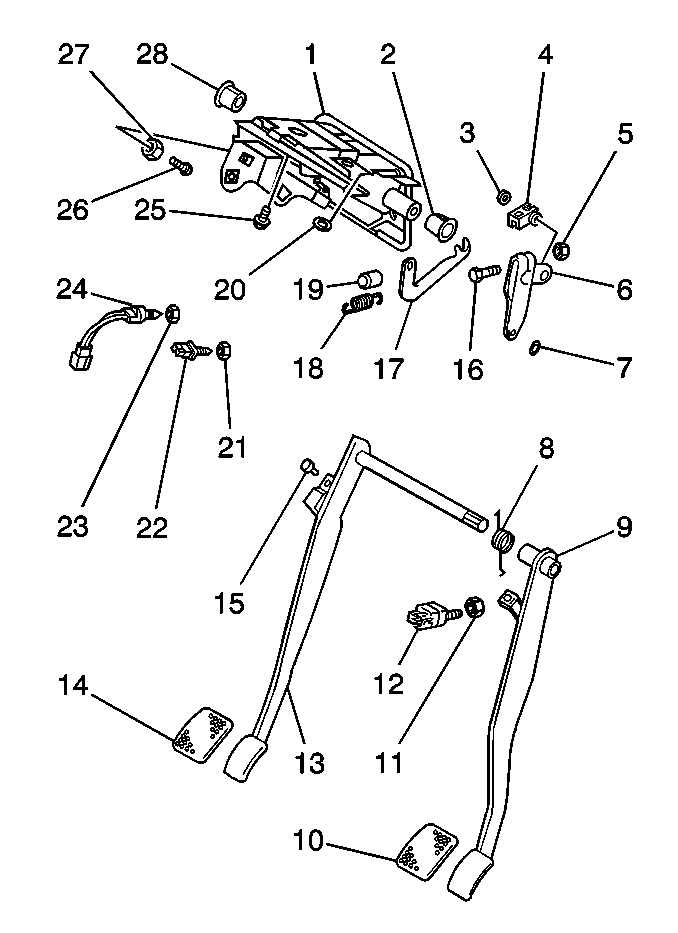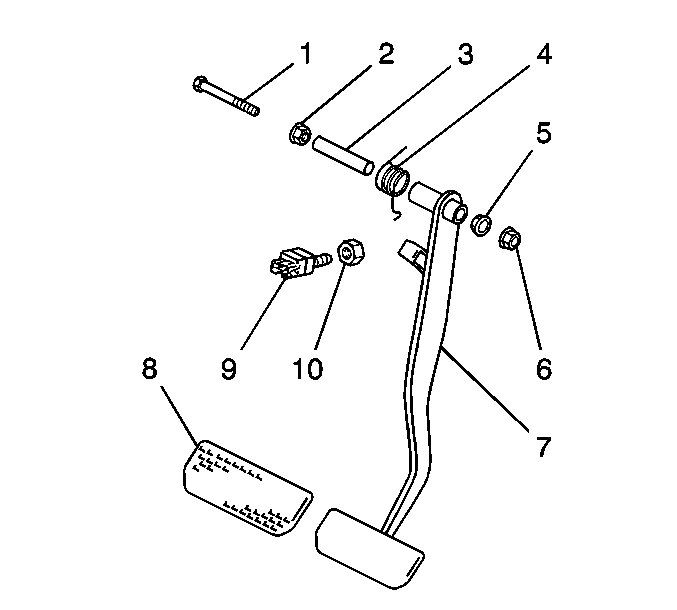Brake Pedal Assembly Replacement Manual Transmission
Removal Procedure
- Remove the clutch pedal (13). Refer to Clutch Pedal Replacement in Clutch.
- Remove the brake pedal return spring (8) from the clutch pedal shaft.
- Inspect the return spring for distortion or weakness. Replace the return spring if necessary.
- Remove the brake pedal (9) from the clutch pedal shaft.
- Inspect the brake pedal for distortion or damage. Replace the brake pedal if necessary.

Installation Procedure
- Apply Lubriplate® Lubricant, GM P/N 1052196 (Canadian P/N 5264008), or the equivalent, to the return spring (8).
- Install the brake pedal return spring (8) to the clutch pedal shaft.
- Install the brake pedal (9) to the clutch pedal shaft.
- Install the clutch pedal (13). Refer to Clutch Pedal Replacement in Clutch.
- Hook the return spring on the brake pedal lever.
- Measure the brake pedal travel. Refer to Brake Pedal Travel Measurement and Inspection .
- Measure the distance from the stop lamp switch to the brake pedal stopper. Adjust the stop lamp switch if necessary. Refer to Stop Lamp Switch Adjustment in Lighting Systems.

Important: Do not hook the return spring on the brake pedal lever before installing the pedal to the bracket.
Brake Pedal Assembly Replacement Automatic Transmission
Removal Procedure
- Disconnect the stop lamp switch (9).
- Remove the brake pedal push rod clevis pin retainer.
- Remove the brake pedal push rod clevis pin.
- Remove the nut (6) from the brake pedal pivot pin bolt (1).
- Remove the brake pedal pivot pin bolt (1) from the brake pedal bracket.
- Remove the brake pedal (7) from the bracket.
- Remove the return spring (4) from the brake pedal.
- Remove the bushings (2,5) and the spacer (3) from the brake pedal.

Inspection Procedure
- Inspect the bushings and the spacer for wear. Replace if necessary.
- Inspect the return spring for distortion or weakness. Replace if necessary.
- Inspect the brake pedal for distortion or damage. Replace if necessary.
- Inspect the brake pedal pivot pin bolt for wear or damage. Replace if necessary.
Installation Procedure
- Apply Lubriplate® Lubricant, GM P/N 1052196 (Canadian P/N 5264008), or the equivalent, to the spacer (3) and the bushings (2,5).
- Install the spacer and the bushings to the brake pedal (7).
- Apply Lubriplate® Lubricant, GM P/N 1052196 (Canadian P/N 5264008), or the equivalent, to the return spring (4).
- Install the return spring to the pivot shaft portion of the brake pedal.
- Install the brake pedal and the pivot pin bolt (1) to the bracket.
- Install the nut (6) to the pivot pin bolt.
- Install the brake pedal push rod clevis pin.
- Install the retainer to the clevis pin.
- Connect the stop lamp switch.
- Hook the return spring on the brake pedal lever.
- Measure the brake pedal travel. Adjust the brake pedal travel if necessary. Refer to Brake Pedal Travel Measurement and Inspection .
- Measure the distance from the stop lamp switch to the brake pedal stopper. Adjust the stop lamp switch if necessary. Refer to Stop Lamp Switch Adjustment in Lighting Systems.

Important: Do not hook the return spring on the brake pedal lever before installing the pedal to the bracket.
Notice: Use the correct fastener in the correct location. Replacement fasteners must be the correct part number for that application. Fasteners requiring replacement or fasteners requiring the use of thread locking compound or sealant are identified in the service procedure. Do not use paints, lubricants, or corrosion inhibitors on fasteners or fastener joint surfaces unless specified. These coatings affect fastener torque and joint clamping force and may damage the fastener. Use the correct tightening sequence and specifications when installing fasteners in order to avoid damage to parts and systems.
Tighten
Tighten the nut to 24 N·m (17.7 lb ft).
